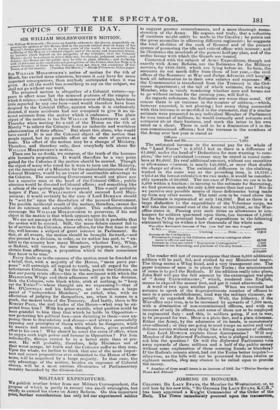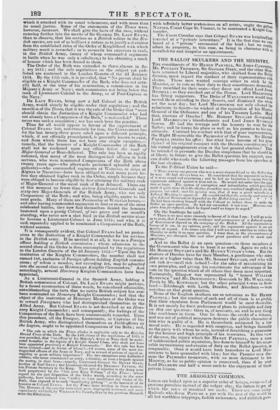JOBBING IN HONOURS.
COLONEL DE LACY EVANS, the Member for Westminster, or, to call him by his new title, "Sir GEORGE Da LACY EVANS, K.C.B.," has been appointed a Knight Commander of the Order of the Bath. The Times immediately pounced upon the transaction, which it attacked with its usual vehemence, and with more than its usual justice. Some of the statements of the Times were, however, incorrect. We shall give the facts of the case, without entering further into the merits of Sir GEORGE DE LACY EVAN% than to observe, that his services as a British soldier in the Bri- tish service, are not of so brilliant a nature as to justify a deviation from the established rules of the Order of Knighthood with which military merit is rewarded ; or to reconcile his superiors in rank, in the British Army, (many of whom commanded regiments in battle when he was only a subaltern,) to his obtaining a mark of honour which has been denied to them.
The Order of the Bath was extended to three classes in Ja- n .ary 1815 ; awl the only regulations on the subject yet pub- lished are contained in the London Gazette cf the 24 January 1815. By the 13th rule, it is provided, that " No person shall be eligible as a Knight Commander of the Bath. who does not actu- ally Bold, at the time of his nomination, a commission in his Majesty's Army or Navy; such commission nut being ham the rank of Lieutenant-Colonel in the Army, or of Post-Captain in the Navy." DE LACY EVANS, being now a full Colonel in the British Army, would clearly be eligible under that regulation ; and the assertion of the Times, that it was the rule of the Order that "none should obtain the distinction of a Knight Commander who had not already been a Companion of the Bath," is unfounded.* There never was such a regulation ; nor has such been the practice.
Thus far all would appear in favour of the appointment of Colonel EVANS: but, unfiatunately for him, the Guveritment has for the last twenty-three years acted upon a different principle., which, if not officially promulgated, is generally known to exist, and from which there has not been one single exception,— namely, that the honours of a Knight Commander of the Bath shall not be conferred upon any officer below the rank of Major-General or Rear-Admiral. This rule has been so rigidly enforced, that many of the most distinguished officers in both services, who were nominated Companions of' the Bath above twenty years ago—who afterwards performed splendid acts of gallantry—who commanded regiments at Waterloo, or ships at Algiers or Navarino—have been obliged to wait many years be- fore they obtained higher rank in the Order, simply because they were obliged to become eligible by first attaining the military rank of Major-General or the naval rank of Rear Admiral. There are at this moment no fewer than sixteen Lieutenant-Generals and sixty-two Major-Generals of the British Army, who are only Companions of the Bath ; and who, being eligible, aspire to the next grade. Many of them are Peninsular or Waterloo heroes,— and after having commanded regiments in four or more of the most celebrated battles, they now find themselves denied the honours bestowed upon a young Colonel, of two years and one month's standing, who never saw a shot fired in the British service since he became a Lieutenant-Colonel in June 1815; and who, it is said, repeatedly applied to be nominated a Companion of the Bath, without success.
It is consequently evident, that Colonel EVANS had no preten- sions to the distinction of a Knight Commander for his services in the British army. If he merited it at all, it was as a Foreign officer holding a British commission ; whose admission to the second class of the Order is thus contemplated by the regulations in the London Gazette of the 2d January 1815—" Upon the first institution of the Knights Commanders, the number shall not exceed 180, exclusive of Foreign officers holding English commis- sions; of whom a number, not exceeding ten, may be admitted into the second class as HONORARY Knights Commanders." And accordingly, several Honorary Knights Commanders have been appointed.
As a Lieutenant-General in the Spanish Army, holding a British commission of Colonel, DE LACY EVANS might perhaps, by a forced construction of these words, be considered admissible, notwithstanding the facts that no native British subject has ever been nominated an Honorary Knight Commander ; and that the object of the institution of Honorary Members of the Order was to reward Foreigners who had distinguished themselves in the Allied Army. But Colonel EVANS IS not described as an Hono- rary Knight Commander ; and consequently, the feelings of the Companions of the Bath have been unnecessarily wounded. Upon this precedent, all the Ensigns, Lieutenants, or Captains of the British Army, who distinguished themselves as Field-otficers in the Legion, ought to be appointed Companions of the Bath ; and, • The rule to which the Times alludes is applicable only to the Knights Grand Cross of the Bath. By the 14th clause of the regulations of 1815, it was provided, that "no officer of his Majesty's Army or Navy shall be nomi- nated hereafter to the dignity of a Knight Grand Cross, who shall not have been appointed previously a Kniyht Commander." But this rule has been twice violated—and in favour of whom ?-0f course, some of the most dis- tinguished officers of the Army or Navy, and in reward of actions of signal in- trepidity or great military importance? The two exceptions were featherbed soldiers, who never commanded an army, a division, or even a brigade against the enemy, in their lives,—namely, Lieutenant-General Sir HENRY GREY, brother of Earl GREY; and LieUteIIRIII•Gelleral Sir IIERUERT TAYLOR, the late Private Secretary to the King. These acts of injustice to the Army were both perpetrated by the "late poor King William" of the Times ; whose regard for the just disposition of the Order would, according to the same authority, have induced hint " rather to have annihilated the Order of the Bath, than exposed it to such ' humiliating jobbing ' " as the bestowal of its honours on Colonel EVANS, Let Tiner's learn wisdom iu these matters. The Ilonours of the country were often noire improperly bestowed, and mute capriciously withheld, by WILLIAM the Fourth, than by any previous Monarch since the ReVolution. with infinitely better pretensions on all points, ought the gallant NAPIER, Count Cape St. Vincent, to be nominated a Knight ere. mender.
The Court Circular says that Colonel EVANS was knighteffand invested at iv "private investiture." It is the first time we ever heard of a " private" ceremonial of the kind : but we readily admit its propriety, in this case, as being in character with se uncalled-for and irregular an appointment.



























 Previous page
Previous page